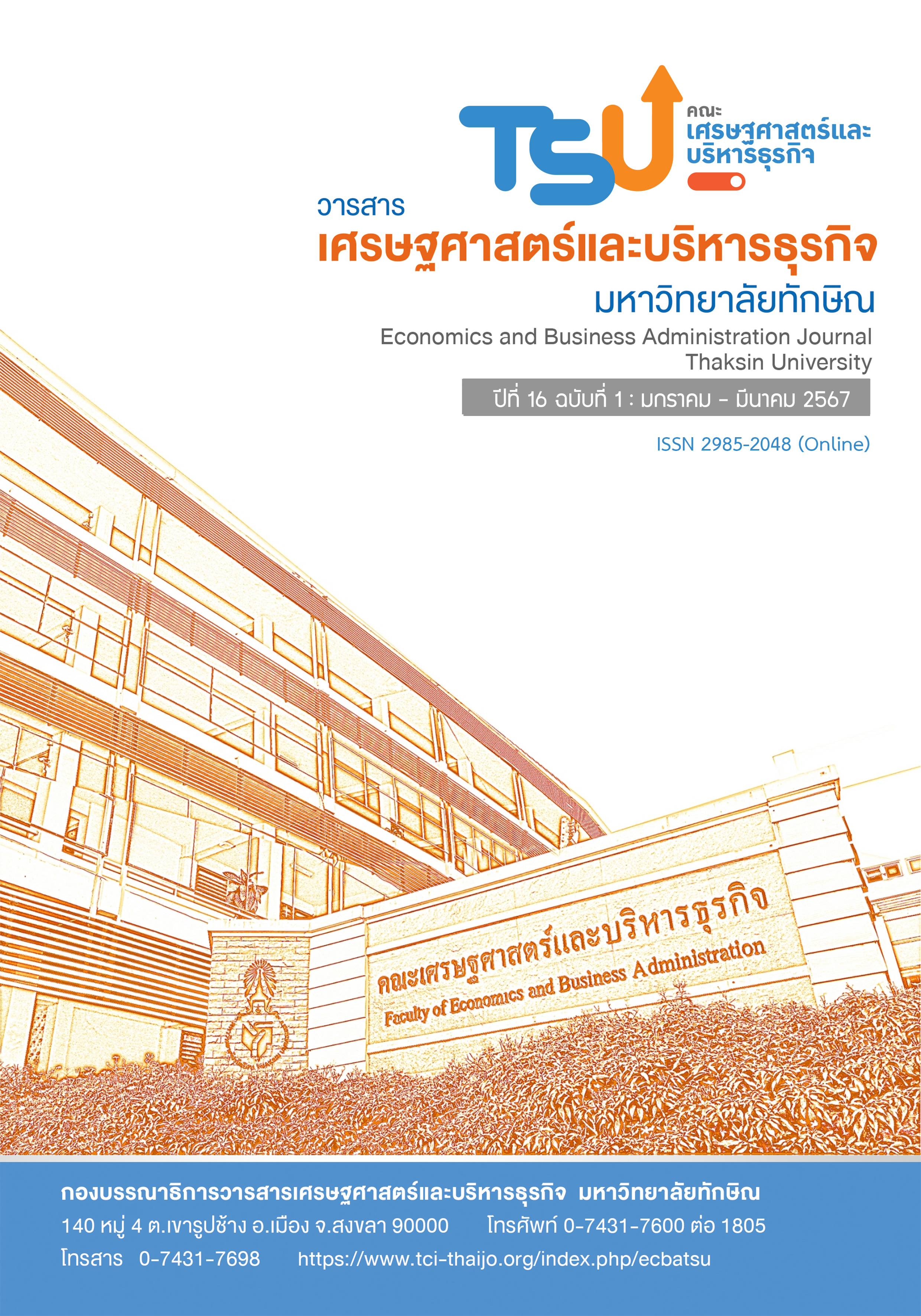A Model of Community Forest Lifestyle Tourism of Kon Ton Narm Barn Wang Sai Tourism Community Enterprise Group, Tham Yai Sub District, Thung Song District, Nakhon Si Thammarat Province
DOI:
https://doi.org/10.55164/ecbajournal.v16i1.262580Keywords:
community Based Tourism, Model of Community Forest Lifestyle Tourism, Tourism Community EnterpriseAbstract
The purposes of this research were to 1) develop a community forest lifestyle tourist route of Kon Ton Narm Barn Wang Sai Tourism Community Enterprise Group 2) schedule the tourism activities of Kon Ton Narm Barn Wang Sai Tourism Community Enterprise Group 3) create medias for disseminating activities using by information technology of Kon Ton Narm Barn Wang Sai Tourism Community Enterprise Group and 4) study the experts’ opinions toward the community forest tourism model of Kon Ton Narm Barn Wang Sai Tourism Community Enterprise Group. This research was a qualitative research methodology. The group of key information provider representing 20 persons selected by purposive sampling was consisted of a panel of 5 academics, 5 community’s members, data were collected by using trekking activities and focus group and a panel of 10 community tourism management experts, data were collected interviewing using a structured interview form to study the experts’ opinions. Data were analyzed by content analysis.
The results of the study showed that 1) The developed a community forest lifestyle tourist route of Kon Ton Narm Barn Wang Sai were 7 kilometers long distance consisted of 9 learning areas that is outstanding and have potential conduct forest activities create the participation of tourists 2) the one day trip activities for tourists are interested in community tourism activities want novelty adventurous and like to travel in nature 3) there were medias for disseminating activities using by information technology consisted of description labels, tourist guide brochure and Facebook fan page of Kon Ton Narm Ban Wang Sai tourism community enterprise group and 4) the experts' opinions found that the learning areas on the Ban Wang Sai community forest tourism route all 9 points and the one-day trip were confirmed that the most suitable. There were medias for disseminating activities the experts confirmed that it’s high suitable and other opinions were to develop of community communicator’s English skills for accommodate foreign tourists in the future and recommended that the community have to provide for the safety of tourists.
References
Buakaw, S., Petchit, J., & Thammachot, N. (2018). Participation in the Community Development among People in Barn WanSai Tambon ThamYai Amphoe Thungsong Nakhon Si Thammarat. Unpublished Research Report. Songkhla : Rajamangala University of Technology Srivijaya.
Buamali, S., & Srinaruewan, P. (2019). Developing a Model of Baan Pasakngam Community-vased Tourism Management, Luang Nuea, Sub-district, Doi Daket District. Paper Presented at The 3nd International MultiConference of Management Science 2019 (IMMS 2019), Bansomdej Chaopaya Rajabhat University.
Daolomchan, P., Prapinpongsakorn, S., & Techataweewan, W. (2021). Information-seeking Behaviors of Thai Generation Y Travelers. Journal of Information Science, 39(1), 38-58.
Designated Areas for Sustainable Tourism Administration. (2015). Community-Based Tourism. Bangkok: Co Coon & Co. Ltd.
Lertpongmanee, K. (2022). Community-based Tourism Management for Sustainable Tourism Development. Journal of Pacific Institute of Management science Humanities and Social Sciences, 8(1), 19-33.
Maneeroj, N. (2017). Community Based Tourism Management. Journal of International and Thai Tourism, 13(2), 25-46.
Ministry of Tourism & Sports. (2007). CBT Network handbook. Bangkok: Srimungkarnpim.
Naksanee, T. (2012). A Project to Develop Tourism Routes: A Case Study of Dvaravati Civilization-Khmer Sites in Ratchaburi Province, Thailand. Journal of International and Thai Tourism, 8(2), 1-17.
Paladsuwattanabuddhikun. P. (2021). The Development of the Ecotourism Routs in Neanmaprang District Phitsanulok Province. Journal of Social Science and Buddhistic Anthropology, 6(8), 87-99.
Promphon, W., & Wattanapinyo, A. (2018). Community Preparedness and Spatial Development for Eco-tourism in Pha Luang Waterfall Forest Park, Ubon Ratchathani Province. Veridian E-Journal, Silpakorn University, 11(2), 2623-2639.
Sasong, C., Sasong, S., & Binprathan, A. (2020). The Development of Eco-tourism Routes Through the Participation of Baan Pa-Miang Community Stakeholders, Chae Son Sub-district, Muang Pan District, Lampang Province. School of Administrative Studies Academic Journal, 3(1), 75-86.
Suansri, P., & Yeejorhor, S. (2003). Community-based Tourism Management Guide. Bangkok: Tourism for Life and Nature.
Wattananarong, K. (2006). Professional Education Technology. Bangkok: Sinthawee.
Wijitboonyarak, P. (2011). Social Media: Future Media. Executive Journal, 31(4), 99-103.
World Tourism Organization. (2016). Tourism, a Factor of Sustainable Development. Retrieved from http://ethics.unwto.org/en/content/global-codeethics-tourism-article-3.
Downloads
Published
How to Cite
Issue
Section
License
Copyright (c) 2024 Faculty of Economics and Business Administration, Thaksin University

This work is licensed under a Creative Commons Attribution-NonCommercial-NoDerivatives 4.0 International License.




